In part one of this interview, Barry Evans the Deputy General Manager – UK and Ireland for KLM during the 1980s and 1990s, went into the details of how the Dutch national airline came to be involved in sponsoring football initially with Brentford and later with QPR before continuing to talk about his love of the club, his trips to three World Cup Finals and his views on Jim Gregory as an owner and Chairman.
In this concluding part, Barry shares some more Jim Gregory stories as well as his views on some other QPR owners and potential owners of the 1980s and 1990s and goes into the details of how the KLM club sponsorship came to an end.
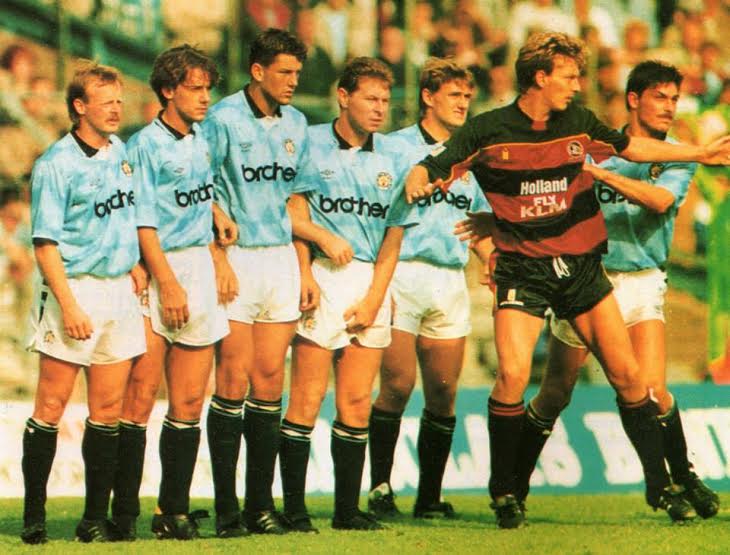 (Alan McDonald at Maine Road, Manchester City 1989 – photo Ariel Friedlander)
(Alan McDonald at Maine Road, Manchester City 1989 – photo Ariel Friedlander)
BE: I did meet Ken Bates through Jim. They had considerable mutual respect and a friendly rivalry, and after all Ken was a QPR fan (born in Ickenham), although this was kept very quiet at the time. Ken made a couple of KLM sponsorship proposals over lunches, laughed when I said: “Ken, I’m sorry I can’t do this, I’m a QPR fan and people know where I live”. A much nicer guy than he is often given credit for.
MP: Bates in fact wanted to buy Rangers from Jim in March 1982 and only bought Chelsea as Jim would not sell at the time.
In a column in the Leeds United match programme versus Rangers in December 2010, Bates, the then Leeds owner, went into a lot of detail about his time as a boyhood Rangers fan living in Ealing and heading to Loftus Road down the Uxbridge Road via a trolley bus.
Bates did not achieve his ambition of buying Rangers and Jim Gregory eventually sold the club to David Bulstrode in 1987. I always thought it sad that David died at a young age when it certainly appeared that he was prepared to invest some serious money on developing the club. What are your memories of David and his time at Rangers?
BE: The week before Jim sold the club there was £1m in the bank at NatWest in Willesden and the only debt was £140k left on the South Africa Road executive boxes. Jim always regretted selling the club and said he sold it too cheaply Рfor £6.6m in cash (!) I have heard, but knowing Jim it would have been much more.
There was a story that Jim sold the club for cash and it needed two taxis to take the money away. His heart was never in Portsmouth, who he later took over before handing the club to his son Martin due to his ill health.
Jim’s view was that everything was for sale. He had bought a brand new Bentley when there was a six-month waiting list for them and he was out at lunch one day when Jarvis Astaire the boxing promoter admired his new car. Jim said: “How much will you give me for it?” Astaire offered him ¬£10k more than Jim had paid, so he sent a waiter across the road to get his driver and car keys, gave the keys to Astaire and then took a cab back to W12.
I was flying down to Nice one weekend to stay with Martin Lange on his boat when Florrie, Jim’s wife, waved at me down the airport lounge. Then Jim appeared and waved me over to join them. They were also flying down to stay on one of his boats. Apparently, someone had pulled out of having a boat built in Antibes and Jim stepped in and saved the boatyard with a mutually satisfactory offer. They wanted to give Jim the freedom of Antibes, but he was so painfully shy he was going to send his accountant Brian Henson down to accept it.
I was introduced to David Bulstrode by a mutual friend and liked him, although he and his co-investors had no idea at all about football. Jim surrounded himself with a notional “board” with QPR people; Williamson, Chandler, Ingham and Rowe, who were also football people and understood the business. David and his people didn’t, and I’m afraid even if he had lived it would have all gone horribly wrong, as it was all paper money come the property crash.
Things changed the night David died in September 1988. Within four days we’d had three chairmen, the shortest tenure being Robert Noonan, an Irish property developer who adopted an English name. Robert acted with what seemed indecent haste after David’s death and by Saturday he had sold the club on to Richard Thompson. Richard again knew little about the game but did occasionally suggest an early evening drink in ‘The Churchill’ to me to feel his way into the job.
He seemed to think he needed to deal directly with the players, but I warned him that some of them would take the fillings out of his teeth!
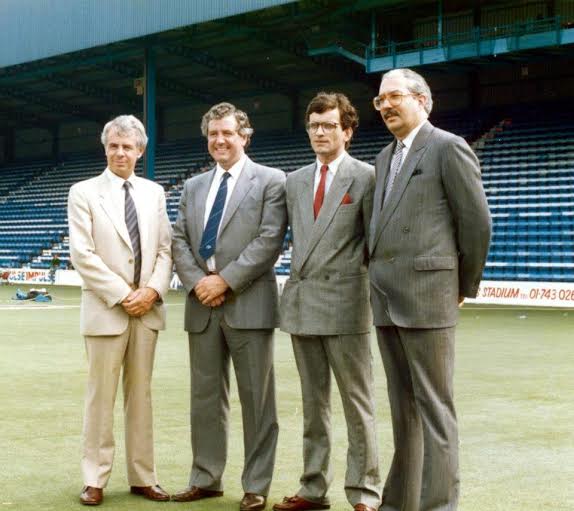 (Barry Evans far left next to David Bulstrode at the launch of the KLM Sponsorship in 1987)
(Barry Evans far left next to David Bulstrode at the launch of the KLM Sponsorship in 1987)
MP: The former players’ agent Clive Berlin had two spells with Rangers and many people believe that he helped create the situation where Rangers started to squander money on some poor player signings and eventually be relegated from the then relatively new Premier Division after finishing the highest placed London club in the first season of the new league in 1992/3. What are your views on Berlin?
BE: Hmmm, I may have to consult my lawyer on this question! The parallel I would make is with Joey Barton who thinks he is a much better player than he actually is. The same applies to Berlin as the Chief Executive of a football club. There are things I could say but probably shouldn’t, but I’ll cite a couple of examples….
We were invited over one afternoon to view the new shirt design proposal, or at least I thought it was a proposal. The Kumar boys from Birmingham were there as were Tony Ingham and Brian Rowe. The KLM logo was red out of white, which I immediately rejected. Berlin said: “Why?” When I said: “It’s not acceptable as our corporate identity”, he replied that they had already manufactured 5,000 shirts!
I told him that he had a real problem then and if I ever saw one on a market stall in Shepherd’s Bush Market then there would be no sponsorship money from KLM at all! To our collective amazement he then even tried to blame me for the debacle!
As the three-year sponsorship deal approached its end in 1990, Clive suggested that Giedie Bierens, the UK and Ireland Director of the Netherlands Tourist Board and I, meet Richard Thompson for lunch in ‘Langans’ on a Friday. Giedie and I were aware that this was probably not going to go well.
Interestingly Martin Lange and Ron Noades were at the next table and the ma√Ætre d’ Michael Henry, a big Chelsea fan, was watching also with interest.
You must remember that QPR had announced the KLM deal in 1987 was a million pound deal. In fact we paid ¬£55k, ¬£57.5k and ¬£60k a year and I took out a ¬£1m insurance cover in case we won the league, FA Cup, League Cup, scored the most goals, the most hat tricks, and all possible contingencies including participating in topless table tennis! The fact that the premium was only ¬£4.5k reflects the underwriter’s views on the risk!
At the lunch, where Richard Thompson was clearly apprehensive, Clive started by inviting an offer from us but I said that as he was selling he should make us an offer….and also confirm that he was buying lunch.
His offer was £300k+ a year but as we were in exactly the same position as three years before and had achieved nothing since then Рand we were also largely treated as necessary baggage Рwe declined to even make a counter-offer.
They replaced us initially with CSF, another of Richard’s companies to at least have a name on the shirt I am told. To give you an insight into how life had changed, my initial deal with David Bulstrode was on one A4 page….with Berlin the new proposal was a 67 page contract!
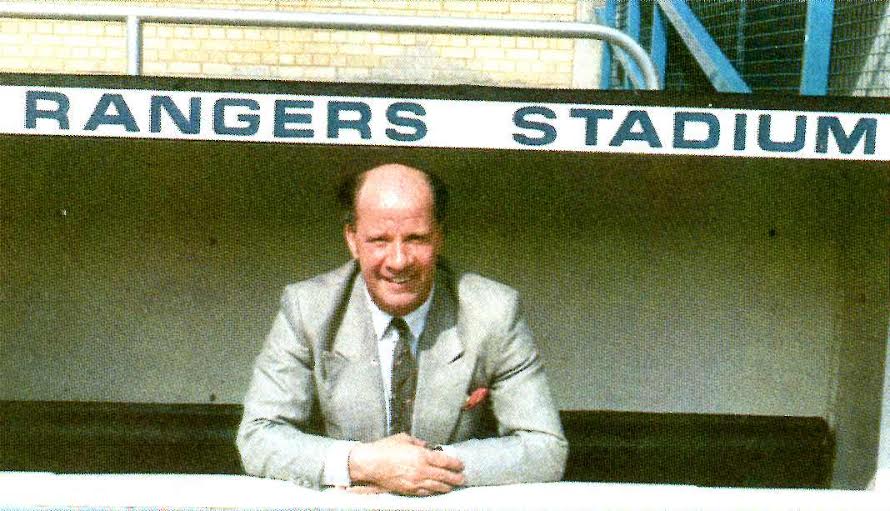 (Jim Smith – photo Ariel Friedlander)
(Jim Smith – photo Ariel Friedlander)
MP: Tell us about some of the backroom staff from your time – Ron Phillips, Sheila Marson etc. plus the managers; Jim Smith, Trevor Francis and Don Howe.
BE: Ron Phillips was a “one off”, a bowler hat and furled umbrella in August and his window permanently open in all weathers, just in case Jim was on the warpath and Ron had to climb out of the window – which he did often I am told.
Sheila was/is a lovely lady and perfect in that job, and should probably still be there! Tony Ingham and Brian Rowe were great QPR servants and of course fans too.
Jim Smith was great value and tremendous entertainment on away trips, especially over dinner on the Friday night, but he could be dangerous. On one trip I had to suggest to David Bulstrode that he go to bed as the way things were going he would have no option but to sack Jim if he stayed up! Jim was no great respecter of authority and he was partial to a glass of wine.
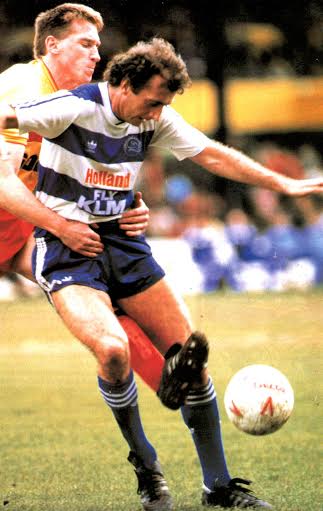 (Trevor Francis – photo Marc Morris)
(Trevor Francis – photo Marc Morris)
I am afraid that I lost all respect for Trevor Francis over the Martin Allen affair. I was with Tony Ingham when Martin came to him late at night, away at Newcastle, and Martin explained that his wife was in labour and asked if he could leave to go home to the hospital.
Trevor was in bed so Tony, as a Director, clearly gave him permission to leave. Tony was reluctant to appear at the FA tribunal, for obvious reasons, and although I told Trevor that Martin was told to go home he was fined two weeks wages. Not impressive.
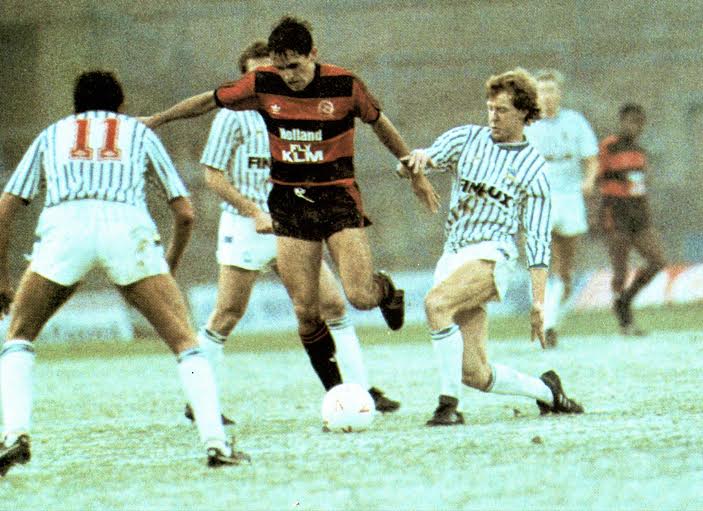 (Martin Allen – photo Ariel Friedlander)
(Martin Allen – photo Ariel Friedlander)
Don Howe was also good company on away trips as he was a very accomplished magician, apart from his tactical football nous. He was also an extremely nice guy.
The manager who impressed me most was Terry Venables, who remains a friend and occasionally asks me how things are down at the Rangers. Terry’s team talks, he let me attend a couple, his wit and humour, his Jim Gregory stories but above all his football knowledge was amazing.
MP: Rangers were playing in Adidas kit at the time that KLM became involved with the club and later switched to Influence – owned by the Kumar brothers. What are your recollections of them?
BE: I only ever met them once at the “red logo” shirt incident mentioned earlier.
MP: There was a friendly game versus Sparta Rotterdam in the Netherlands arranged for July 1988. Do you recall why it didn’t take place?
BE: I am afraid that I have no recollection of this.
MP: My recollection is that it was cancelled due to worries about potential crowd trouble in the era when English clubs were still banned from European competition by UEFA post Heysel from 1985 to 1990. A pity as the previous years trips to Breda and Alkmaar were highly enjoyable for the handful of fans who travelled.
You were quoted at the time that the sponsorship deal ended as follows –
25 July 1990 – Citing fan violence, “KLM Royal Dutch Airlines has decided not to extend its sponsorship of Queen’s Park Rangers of the English first division. Every time there was an incident, it seemed to involve English supporters,” KLM General Manager Barry Evans was quoted in ‘The Times’.
“We recognise that the problem is not only in the United Kingdom and that football hooliganism is not good in the Netherlands either. But it is here in England that we are trying to promote our product, and the problem is still bad enough to have made us decide that soccer is not a sport that we want to be associated with any longer.”
What were the circumstances that led to this?
BE: I think that ‘The Times’ may have lifted that story from the largest Dutch newspaper ‘De Telegraaf’ to whom I had used this as an alternative to saying: “I am dealing with an incompetent bunch of idiots who don’t understand football, don’t give value for money and who are going to ruin my favourite football club.”
MP: What do you do nowadays and do you still follow Rangers?
BE: I am semi-retired, but with minority stakes in a couple of companies and a gorgeous first grandchild. I do still follow Rangers, but mainly only home games now and I gave up the season tickets after watching Chris Ramsey’s view of football – too depressing!!!
MP: What are your thoughts on how the club is now run? Can you see the stadium move happening and do you think it’s needed?
BE: Difficult to say from my position outside the club, but there was a time post-Briatore when I thought it could not get any worse. Personally I would have liked the Mittals take over and Amit run it. Well I like our “cave” and too many stadia are soulless. I think getting it right on the pitch and financially are the greater priorities. I detect a glimmer of hope that finally we might be getting it right.
MP: What are your views on modern football – the fans, the players, the stadia, and the business aspects of the game?
BE: I know the man who did the first Sky deal and he admits that every penny, because there were no restrictions, went straight through the clubs into the pockets of the players and agents – nothing stayed in the game.
There are over 500 approved FIFA agents in the UK alone. The fans are wiser, the players richer but £65,000 a week wages for the likes of Barton and Shaun Wright-Phillips is barking mad! Stan Bowles never earned more than £600 a week, with more talent than any five QPR players on the pitch at any one time nowadays.
Uncontrolled ownership by foreign investors who are only here to inflate their egos is also worrying. Nowadays the TV deals seem to determine everything, and it’s the England national team performance that seems to suffer.
MP: I’d like to thank Barry for a very entertaining and highly informative interview and my cousin Julie Robinson for first introducing us.
Martin Percival
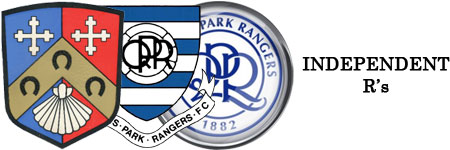
All excellent stuff Martin.
Glad you enjoyed it – a few gems that I had not come across before!
Glad you enjoyed it – a few gems that I had not come across before!
Fascinating. Thanks Martin.
A very entertaining read, a real eye opener. Cheers Martin.
Great read. What sort of idiot would order 5,000 shirts without running it past the sponsor?! Quite incredible. lol